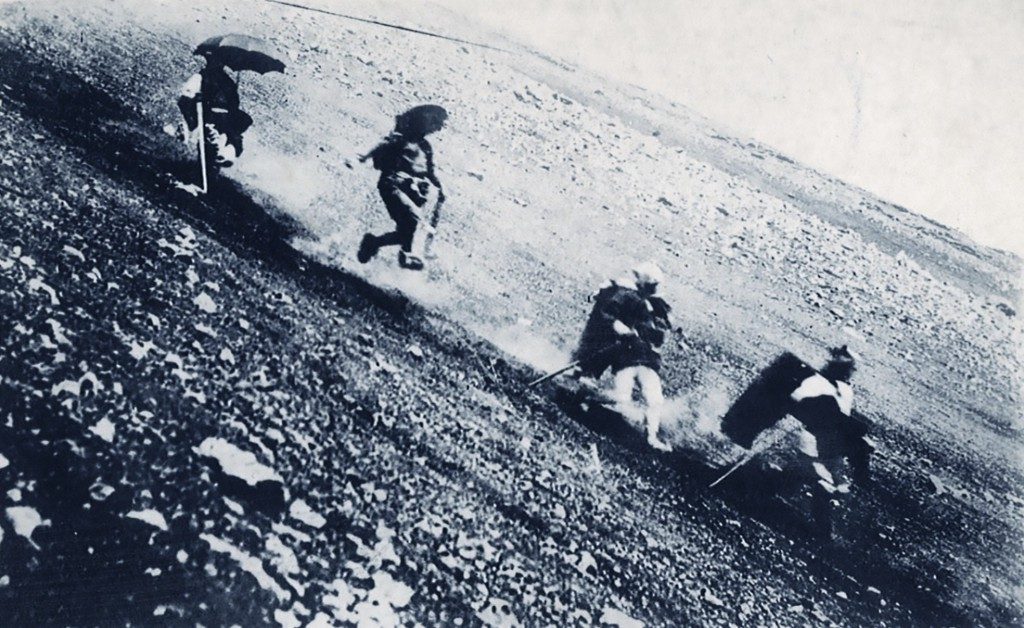Fiona Tan is an artist who works primarily in film and photography. Tan represented The Netherlands in the 2009 Venice Biennale. Her work can be found in numerous international art collections including the Tate Modern, Stedelijk Museum Amsterdam, and the Centre Pompidou. Her first feature, “History’s Future,” premiered at the 2015 International Film Festival Rotterdam.
“Ascent” will premiere at the 2016 BFI London Film Festival on October 8.
W&H: Describe the film for us in your own words.
F: “Ascent” is a film of, with, and about a mountain of immeasurable cultural and artistic significance — Mount Fuji. Together with two protagonists the viewer climbs Mount Fuji across geographical, temporal, and cultural divides. I call this film a photo-film. It is a film made entirely with stills: a filmic experiment balancing delicately between documentary and fiction.
W&H: What drew you to this story?
FT: I developed the story out of the images. The 4,000 photographs of Mount Fuji which I collected for this project were much more diverse and surprising than I had expected. Also, they were of breath-taking beauty.
Mount Fuji is a volcano with many faces and my research took me deeper and deeper and became more and more fascinating: What I initially envisaged as a short video just grew and grew and eventually turned into a feature length film.
W&H: What do you want people to think about when they are leaving the theater?
FT: Photography, film, the mountain, love, loss, and the teeth of time.
W&H: What was the biggest challenge in making the film?
FT: Looking back I can see there were two main challenges.
The first one was also a major motivation for me to make the film. I wanted to create cinema with its antithesis — to make a movie out of entirely still images. My burning desire was to bring film back to its core — to its bare essentials — and to make film with the most elementary means. But how to make cinema without movement? My editor, Nathalie Alonso Casale, and I worked long and hard, questioning everything we had taken for granted up till now.
The second challenge was the production method. The script, montage, and sound design for this film was developed simultaneously and in close collaboration. The editing was very dependent upon the script. But the narrative was equally dependent upon the shots — the images and what we could do with them in the montage. My editor and I worked very closely with my sound designer, Hugo Dijkstal, throughout the trial editing and subsequent versions of the montage. Without sound nothing moves.
W&H: How did you get your film funded? Share some insights into how you got the film made.
FT: I am very lucky that I could work with a small crew of wonderful people I have worked with closely before. That gave me freedom to work in the way which was necessary for this film even though all the funding was not in place on the outset.
Initial funding and support for this project came from the Izu Photo Museum in Japan and from my gallery in Tokyo. Izu Photo Museum were a great help and gave me access to their historical photography collection and launched a website where people could upload their own photos of Mount Fuji for “Ascent.” Additional funding was provided by the Netherlands Film Fund and by my gallery in London.
W&H: What’s the best and worst advice you’ve received?
FT: The best advice: Be yourself and take your time.
I can’t remember the worst advice; I tend to forget things like that very quickly, luckily.
W&H: What advice do you have for other female directors?
FT: Never give up. Insist upon fair treatment. Find female colleagues with whom you can share, who inspire you and support you.
W&H: Name your favorite woman-directed film and why.
FT: Chantal Akerman’s “Jeanne Dielman, 23 quai du Commerce, 1080 Bruxelles.” I admire this film for its boldness, uncompromising beauty, and steadfastness.
I also hold films by Agnes Varda, Claire Denis, and Heddy Honigmann dear. If these female directors managed to make films like this in the ’60s, ’70s, ’80s why can’t we — filmmakers of my generation — achieve the same now?







